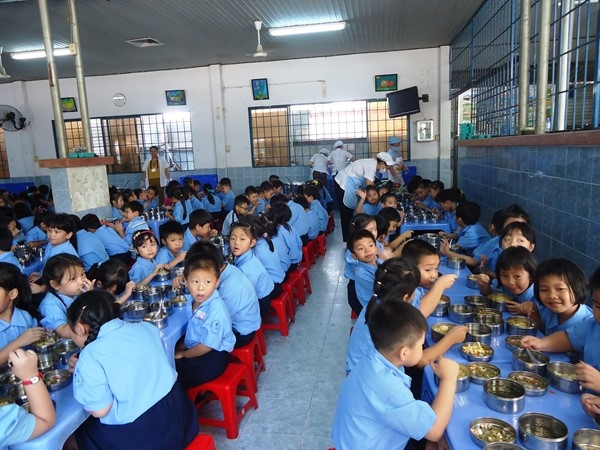 Society
Society

HCM City officials have suggested setting up standard kitchens at both private and public schools with 1,000 students and more to ensure safe, hygienic meals.
 |
| Students have lunch at a school in HCM City. HCM City officials have suggested setting up standard kitchens at both private and public schools to ensure safe, hygienic meals. — Photo laodong.com.vn |
HCM CITY — HCM City officials have suggested setting up standard kitchens at both private and public schools that have over 1,000 students to ensure safe, hygienic meals.
Many schools use outside food caterers to provide meals to students.
At a workshop held on Thursday in HCM City, Nguyễn Thị Huỳnh Mai, the deputy head of the Food Safety and Hygiene Division, said that five food poisoning cases had occurred in the city in the first four months, compared to a total of six last year.
Of the five cases, more than a half occurred at schools, Mai said. There were no cases in 2012 and 2013.
The latest food poisoning case was at Trần Quang Khải Primary School in District 1, she said.
The division discovered the main cause for poisoning because Chinese barbecue pork was contaminated with bacteria of Staphylococcus aureus and enterotoxins.
The lunch was provided by one processed-food supplier, she said.
The total fines imposed this year rose to VNĐ48 million (US$2,133).
She said that through inspection and analysis, most of food poisoning cases were found due to bacteria contamination during processing.
Twenty-four per cent were caused by improper food storage, she added.
“Most food poisoning cases occurred in March, April, July and August when there was a transition from the rainy season to sunny season. This is a favourable condition for the development of illness-caused bacteria,” Mai said.
Of total food poisoning occurring between 2012 and the first four months of 2016, 52 per cent of 25 cases involved meals provided by the suppliers, she said.
“The best way to reduce food poisoning is to require schools with 1,000 students and above to set up a standard kitchen to provide lunches,” Mai said.
Currently, 1,620 schools have kitchens, and 318 processed-food suppliers provided meals to schools.
Phạm Thành Long, a representative of the city Department of Education and Training, said it would require schools with enough facilities to set up kitchens.
“Processed meals provided by food suppliers are outside the management of the education sector. This is a shortcoming,” Long said.
Phạm Văn Khoa, deputy head of educational division in District 3, said that setting up standard kitchens were difficult because of limited space.
Trần Thị Nga, principal of Hồng Ngọc Primary and Secondary School in Tân Phú District and former rector of Phan Chu Trinh Primary School, told Việt Nam News that areas for kitchens were encompassed in school's construction design.
“However, many schools do not have kitchen. Some of them don’t have enough classrooms, and they must take advantage of the areas for classrooms,” Nga said.
To serve lunches to all-day students, they work with processed food suppliers, she added.
“When using processed food, prices for lunches are higher than meals made by the school’s kitchen. Moreover, lunches transported from the supplier’s facility to school are not hot and delicious,” she added.
Public schools have an advantage in that they can ask students’parents to contribute money for setting up kitchens, Nga said. — VNS




